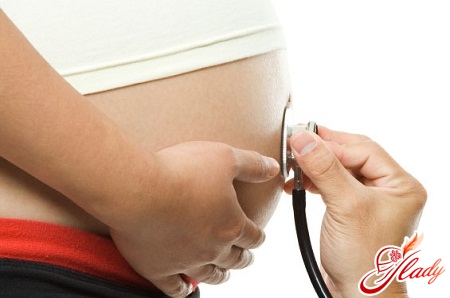 While waiting for a child, a pregnant womancan lie in wait for a variety of dangers. Unfortunately, during pregnancy, the female body becomes the most vulnerable. Therefore, the future mother can face even those diseases that she had never worried before. The topic of our today's conversation will be such a problem as chlamydia and pregnancy. Chlamydia is a very insidious disease. Numerous clinical studies have reliably shown that the presence of chlamydia in a woman has a very negative effect on the reproductive system. First, chlamydia with high probability may lead to the development of infertility. Well, if the future mother suffers from chlamydia, it can cause the infection of the child and even the termination of pregnancy.
While waiting for a child, a pregnant womancan lie in wait for a variety of dangers. Unfortunately, during pregnancy, the female body becomes the most vulnerable. Therefore, the future mother can face even those diseases that she had never worried before. The topic of our today's conversation will be such a problem as chlamydia and pregnancy. Chlamydia is a very insidious disease. Numerous clinical studies have reliably shown that the presence of chlamydia in a woman has a very negative effect on the reproductive system. First, chlamydia with high probability may lead to the development of infertility. Well, if the future mother suffers from chlamydia, it can cause the infection of the child and even the termination of pregnancy.
What is chlamydia and where does it come from?
Chlamydia are very interesting creatures thatpossess the characteristics of both bacteria and viruses. Chlamydia is several times larger in size than bacteria, but smaller than viruses. Chlamydia viruses are linked by another common feature - they can exist only inside cells. Outside the host organism, they simply die. This is due to the fact that chlamydia can not independently generate energy - they receive it from the cells of the host organism. Most comfortable chlamydia feel in the cells of the genital organs of man. And therefore most often chlamydial infection affects the genitourinary system of a woman. In more rare cases, chlamydia can be localized in the epithelial tissue of the lower parts of the small intestine. By the way, most often it happens in the event that a person has a dysbiosis. In a pregnant woman, chlamydia often affects not only the genital and urinary tract, but also the membranes, and the baby itself. The source of infection is a person who has Chlamydia. It is very important to remember that chlamydia can last a very long time without any symptoms. And even the "carrier" of the disease can not guess that it represents a potential danger for your sexual partner. Chlamydia is a typical representative of a classic sexually transmitted infection. And accordingly, as it is easy to guess, and the way of transmission is sexual, with unprotected sexual intercourse. The use of condoms to some extent reduces the risk of transmission of infection. There is the possibility of infection by chlamydia household way, through contaminated hygiene items - towels, scouring pads and stuff. Although these methods of infection do not account for more than 5% of all cases, it should not be forgotten that all personal hygiene items should be personal. During pregnancy, there is another way of transmitting chlamydia - "vertical", from the genital tract of the mother to the fetus. As mentioned above, during pregnancy, chlamydia penetrate into the amniotic fluid, and then affect the fetus itself. Infection of the fetus is due to the fact that the baby constantly swallows small amounts of amniotic fluid. In addition, the infection can settle on the mucous membranes of the fetus. Chlamydia in pregnancy is not that rare. He meets about every tenth future mother. And often clamidiosis occurs in women with uncomplicated pregnancy, a good general health and social status. Therefore, this danger can not be overlooked by any woman - the problem of chlamydia can affect absolutely any future mother. Well and in that case, if a woman previously had infertility, inflammatory processes of appendages, and even more miscarriages, the risk that she will have chlamydia, exceeds 65%. As a rule, doctors always pay close attention to this factor. The woman goes to the examination, allowing to confirm or deny the presence in her body of chlamydia. If necessary, appropriate treatment is prescribed. And it is much more sensible to undergo the examination in advance, even before the onset of pregnancy. This will avoid many unnecessary worries and unpleasant moments associated with the treatment of the disease. But also in the event that the pregnancy has not occurred, do not despair - modern medicine makes it possible to cure the future mother without any negative consequences for the health of the baby. 
The mechanism of infection
It is impossible not to say a few words about howit is an infection. With close contact with the mucous membranes of the infection carrier, chlamydia penetrate the mucous membranes of a healthy woman. After a short time, chlamydia begins to penetrate into the epithelial cells and cells of the immune system. In these cells, chlamydia can exist for a very long time - up to 3 - 6 years. About two days later the immune system comes into itself. And begins to respond adequately - to produce leukocytes. As a result, an inflammatory reaction develops, the intensity of which can vary from weak to strongly pronounced. In the event that the problem is not noticed immediately, a pathological structural change in the tissues affected by chlamydia is possible. It is these pathological changes in the tissues that are the main complication of chlamydia. In the event that the disease has overtaken a woman before pregnancy, the defeat of the ovaries and the fallopian tube with a high probability may lead to infertility. And during pregnancy, the favorite habitat for chlamydia is the cervix. And, of course, a chronic inflammatory process can not proceed without complications - it can lead to premature termination of pregnancy or premature birth. Infection of the baby is no less dangerous. Organism crumbs of chlamydia cause much greater harm - the probability of malformations of internal organs of the child is high. And sometimes even intrauterine fetal death is possible.
Symptoms of Chlamydia in Pregnant Women
Symptoms of the disease can be different. And in many respects they depend on the stage of development of the infection, and where the inflammatory process is localized. In the event that chlamydia is located in the urethra, it is a question of chlamydial urethritis. With it, the following symptoms are observed:
- Discharge from the urinary canal
In some cases, a smallthe amount of discharge from the urethra. These discharges are usually slightly unclear and have a white tint. In the case of a severe inflammatory process, they may contain an admixture of pus.
- Discomfort in urination
As the disease develops very often duringurination there is a feeling of burning or stinging, as with cystitis. These feelings sometimes give a sick woman many unpleasant minutes - every trip to the toilet becomes a test. And pregnant women, as you know, go to the toilet very, very often because of their physiological characteristics.
- Pain in the abdomen
Inflammatory process can not but affectthe state of the bladder. And as a consequence, a woman can experience a feeling of heaviness and pain in the lower abdomen, in the area of the bladder. Although this type of disease is rare. Much more often there is a cervicitis - chlamydiosis of the cervix. The development of the inflammatory process in this case occurs in the cervical canal. As a result, the cervix becomes swollen enough, it increases in size. If the process lasts a long time, the normal structure of the cervical epithelium is disturbed. As a consequence, it is possible to develop cervical erosion. And for pregnant women a typical place of localization is the mucous membrane of the vagina. This phenomenon is called chlamydial colpitis. In addition, sometimes chlamydia can settle in the glands located near the vagina. Such localization of colpitis is explained by hormonal changes in the body of a woman. However, we must not forget that urogenital chlamydia can very often go absolutely asymptomatically. That is why monitoring of a pregnant woman and a routine examination necessarily includes tests for the presence of chlamydia. In no case can you ignore the doctor's visits and the examinations he has appointed. Indeed, a timely detected problem greatly increases the chances of successful recovery and normal course of pregnancy.
More about the danger
I would like to say more aboutWhat exactly is the danger of chlamydia for a baby. And we will begin the story of infection with chlamydia in the early stages of pregnancy. The most important complication is a spontaneous abortion, or an intrauterine stop of fetal development. This is due to a greater extent due to the fact that chlamydia causes a very strong placental insufficiency. As it is easy to guess, placental insufficiency inevitably leads to a violation of the full supply of oxygen to the child. A lack of oxygen - this is nothing like hypoxia. And you do not need to have special medical knowledge to guess what it threatens the child. It all depends on the degree of severity of hypoxia. If it is moderately expressed, then it is possible to damage various systems and organs, from mild to pronounced. At best, the crumb will be born with a slight muscle tonus, and at worst - with severe lesions of the nervous system. Well, if hypoxia turns out to be too strong, the development of pregnancy can stop altogether - the child will simply die in the uterus. And the results of the violation of the supply of crumbs nutrients are also very deplorable. In the case of an easy disruption, a child appears with iron deficiency anemia, beriberi, very low body weight. All these complications of chlamydia most often develop in the first and second trimester of pregnancy. At the later stages of pregnancy, the most common is a complication, such as infection of the baby itself. As a result of this process, the internal organs of the child are often affected - most often it affects the kidneys, liver and pancreas. Threat to the health and life of the baby depends on the degree of injury. But in any case, treatment should be started as early as possible. This measure will help reduce harm to the child's health.
Diagnosis of chlamydia during pregnancy
Many women often ask - what aboutOur mothers gave birth to children, even without hearing about Chlamydia? Was he not there before? Of course it was. But, to a huge regret, that level of medicine did not allow to reveal chlamydia and diagnose the disease. And all cases of spontaneous termination of pregnancy, stopping the development of the fetus and congenital diseases of the fetus remained with the wording "unclear etiology (origin)". Fortunately, today there are quite a lot of varieties of immunological and microbiological research. The research is quite simple and will not bring any uncomfortable sensations to the woman. To begin with, it is necessary to harvest biological material, which will be thoroughly studied in the aftermath. Biological material - is the discharge from the vagina, cervix and urethra. For this, the future mother will have completely painless strokes. Remember that when you go to see a doctor, you can not syringe. Otherwise, the results of the study may be incorrect. In some cases, it becomes necessary to determine if the baby is infected. For this purpose it is necessary to take a fetal fluid. As a rule, future mothers are usually very frightened. And indeed - some risk is still there. But it is extremely small, since the entire procedure is carefully monitored by ultrasound observation of the manipulations of doctors and the condition of the crumbs. And the doctor will never appoint it if the possible risk is higher than the possible benefit. Therefore, to abandon the study of amniotic fluid is still not worth it. Often, this procedure allows you to timely identify the problem and save the kid not only health, but sometimes life. 
Treatment of chlamydia in expectant mothers
As you could already see for yourself, pregnancy andChlamydia is not the best allies. So, it is necessary to get rid of chlamydia as soon as possible. Treatment of chlamydia in many ways is significantly complicated by the position of a woman - after all, pregnant women can not use all medicines. Chlamydia droop inside the cells of the genitourinary system of the future mother, and there are located. And destroy them only with antibacterial drugs. As a rule, antibiotics from the tetracycline group are very successful with chlamydia. But this treatment even in not pregnant women causes an extremely large number of very different side effects and complications. What can we say about future mothers? Moreover, this group of antibiotics has a very negative effect on the baby's body and that is why it is prohibited for use in pregnant women. Therefore, to date, for the treatment of chlamydia in pregnant women use the most modern antibiotics related to the group of macrolides. For obvious reasons, we are not going to give exact names of medicines in this article, let alone dosage. Moreover, it is impossible to do this. All medicines are picked up by the attending physician, strictly individually and taking into account all the features of the course of pregnancy and the woman's disease. But for successful treatment of chlamydia it must be complex. In addition to taking antibacterial drugs, the doctor will prescribe medications that will eliminate the existing dysbacteriosis of the intestine and vagina, which is an invariable companion of chlamydia. In addition, it is superfluous to conduct a course of treatment aimed at correcting and stimulating the work of the immune system. But remember that the immune system of a pregnant woman is a very difficult question. Therefore, all decisions concerning this issue should be made by the immunologist, together with a gynecologist, who monitors the progress of pregnancy of a sick woman. As a rule, timely and comprehensive treatment of chlamydia brings very good results.
Treatment of chlamydia with folk remedies
There are several quite effective folkrecipes for the treatment of chlamydia, which can be used in pregnant women. They will not have any negative impact on the health of the future mother, much less on the health of the baby. But, nevertheless, if the future mother decides to try one of them, it is still better to consult her gynecologist beforehand. And about such phenomenon, as individual intolerance of this or that component, it is not necessary to forget.
- Infusion of garlic
Amazing antibacterial property of garlicknown to people for many centuries. Not in vain, garlic is used to treat colds and viral diseases. And in the treatment of chlamydia, garlic can also provide invaluable help. First you need to cook the infusion of garlic. It is prepared as follows. Peel 6 garlic cloves, medium in size, chop and pour one glass of hot water. Place in a warm and dark place for about 12 - 14 hours. After this, the resulting infusion should be filtered with gauze. Do not forget to squeeze out pieces of garlic - there is a large amount of useful biologically active substances. The resulting solution is mixed with one tablespoon of honey, mix thoroughly and leave for another hour. The resulting infusion should be used for syringing. Douche, the expectant mother should at least twice a day - in the morning and before bedtime. The course of treatment should not exceed 10 days. Some sources advise in parallel with syringing during the course of treatment to eat two or three cloves of garlic. However, doctors warn that a future mother because of the garlic can begin heartburn.
- Calendula
Very effective in this situation, calendula. It not only has a harmful effect on chlamydia, but also very effectively removes the inflammatory processes that inevitably arise as a consequence of chlamydia. For treatment, an oil infusion of calendula flowers and ordinary infusion is used. Take 50 grams of dry marigold inflorescences, grind them and place them in enameled utensils. Pour the calendula with a glass of olive oil and bring to a boil on low heat. After the oil boils, turn off the heat and leave to infuse for a day. Then strain with gauze cloth and pour into a glass container. It is used as follows: carefully moisten the hygienic tampon of the smallest size in the oil solution and leave it overnight. This procedure should be carried out strictly after the preliminary syringing with infusion of calendula. And the broth is prepared very simply. Place 3 tablespoons of calendula inflorescences in a thermos bottle and pour one liter of boiling water. Close the lid tightly and leave to stand for 24 hours. After this, carefully strain the infusion with gauze cloth, heat to a temperature of 37 - 38 degrees and add 2 spoons of honey. Douching should be done twice a day - in the morning and before bedtime.
Preventive maintenance of a clamidiosis during pregnancy
You can not forget about the prevention of chlamydia. In principle, prevention is very simple, but still it is worth saying a few words about it:
- Observance of personal hygiene
"Cleanliness is the guarantee of health." This simple truth is known to everyone from the cradle. And, nevertheless, very often this truth is neglected. Do not forget to wash your hands regularly, especially after going to the toilet. And by the way - in public toilets do not forget to use disposable laps for the toilet.
- Personal hygiene items
Never and under any pretext do not use other people's towels, washcloths, bed linen. Also, do not give yours too. Even to well-known people whom you completely trust.
- Protected sexual intercourse
Do not forget about the need to usecondoms during sex in the event that you do not have a 100% guarantee of health partner. And pay attention to the fact that no other means of protection from chlamydia will not protect. And finally it is worth repeating again - do not ignore the timely visits of a gynecologist, take all the tests and go through all the examinations. And then no clamidiosis can spoil you the happiest months of your life - the months of waiting to meet with your baby. We advise you to read:









